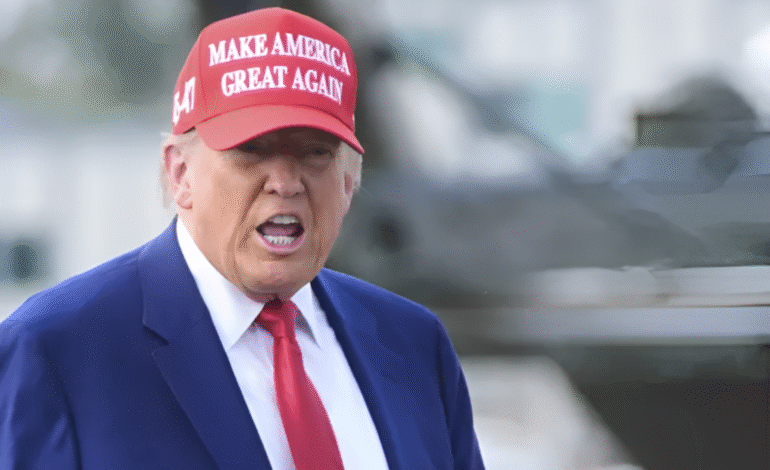Donald Trump Claims Iran-Israel Ceasefire to Begin in 24 Hours

Former U.S. President Donald Trump has claimed that a ceasefire agreement between Iran and Israel has been reached and is expected to be implemented gradually within 24 hours. In a statement made on Truth Social, Trump stated that the ceasefire would bring an “official end” to the escalating hostilities between the two nations.
As of now, neither Iran nor Israel has issued any formal confirmation or public response to Trump’s announcement. The silence has added a layer of uncertainty to what could be a pivotal turning point in a dangerously escalating conflict.
The announcement comes just hours after Iran launched missiles at a United States air base in Qatar, escalating tensions that had already spiked following American strikes on Iranian nuclear facilities.
Escalation Peaks with Missile Strikes on U.S. Air Base in Qatar
Late on Monday night, Iran launched an attack named “Operation Basharat al-Fath” targeting American military positions in Qatar. This was a direct response to what Tehran described as unprovoked aggression by the United States a day earlier when U.S. forces — reportedly in coordination with Israeli intelligence — bombed three of Iran’s most sensitive nuclear sites: Isfahan, Fordow, and Natanz.
The strikes on the Iranian facilities reportedly involved over 75 precision-guided munitions, including bunker-busting bombs. According to Trump, these attacks caused “monumental damage,” particularly to underground infrastructure, although international agencies like the International Atomic Energy Agency (IAEA) have not yet been able to verify the extent of the destruction due to access limitations.
In retaliation, Iran targeted Al Udeid Air Base in Qatar, a major U.S. military hub in the Middle East. The base also serves as a central command for U.S. air operations in the region and is located near facilities of Qatar Airways. While damage assessments remain unclear, the attack signifies a sharp escalation and widened geographical scope of the conflict.
Tel Aviv Under Fire: Civilian Zones Targeted in Iranian Missile Launches
Earlier in the week, Iran launched several ballistic missiles at Israel’s capital, Tel Aviv. These strikes reportedly injured multiple civilians and damaged several residential buildings. The Israeli Defense Forces responded with advanced interception systems like the Iron Dome, but some missiles managed to penetrate defensive layers, prompting widespread alarm.
Israeli officials have not yet provided detailed figures on casualties or damage. However, emergency services were placed on high alert across central Israel, and air-raid shelters were activated as a precautionary measure.
Despite Iran’s prior threats to target U.S. assets and disrupt regional shipping routes, its retaliation so far has remained confined to targeted strikes on U.S. military bases and Israeli cities. Still, experts warn that a broader response could follow if diplomatic efforts fail to materialize.
Global Oil Supply at Risk as Iran Threatens Hormuz Closure
One of the most alarming developments surrounding the conflict is Iran’s renewed threat to close the Strait of Hormuz, a key maritime chokepoint through which nearly 20% of the world’s oil supply passes daily. Iran’s parliament has passed legislation approving the option to shut the strait if deemed necessary for national defense.
While the strait remains open at this time, any move to block or restrict passage could have immediate and dramatic effects on global oil markets. Oil prices have already surged amid the uncertainty, with energy importers across Asia and Europe scrambling to secure alternative supply routes or hedge against potential price shocks.
The United States Navy’s Fifth Fleet, headquartered in Bahrain, has increased patrols in the area, and maritime security alerts have been issued to commercial shipping companies operating in the Persian Gulf and Arabian Sea.
Russia, Global Powers React: Warnings Over Nuclear Proliferation Concerns
Russia has strongly condemned the recent U.S.-Israel strikes on Iran’s nuclear facilities, describing them as a violation of international law and a dangerous move undermining nuclear non-proliferation efforts. Russian officials warned that the attacks could have destabilizing consequences for not just the region but global security at large.
In response, Iran’s Foreign Minister traveled to Moscow for urgent diplomatic talks with President Vladimir Putin and Russian lawmakers. While the details of these discussions have not been disclosed, sources indicate that Russia is seeking to broker de-escalation measures and promote diplomatic dialogue.
The European Union, China, and United Nations officials have echoed calls for restraint. The UN Secretary-General has urged both Iran and Israel to avoid further military action and instead return to the negotiation table to resolve their long-standing differences through peaceful means.
U.S. Issues Global Alert as Civilians Prepare for Uncertainty
The U.S. State Department has issued a worldwide travel alert, warning American citizens to exercise increased caution, particularly in the Middle East and surrounding regions. The advisory reflects growing concern that the conflict could expand into neighboring countries or trigger proxy attacks by aligned militant groups.
In Israel, the civilian population has responded with heightened vigilance. Many urban areas have activated emergency shelters and deployed civil defense personnel. Schools have been closed in some regions, and citizens are being advised to follow official security instructions.
Iranian citizens, particularly those living near sensitive military or nuclear sites, are also facing heightened anxiety. Reports suggest that some communities have begun voluntary evacuations from high-risk zones as a precautionary measure.
Ceasefire Announcement Met with Caution as Verification Lags
Despite Trump’s declaration, international observers remain cautious about the ceasefire’s viability. As of Tuesday evening, no joint statement or multilateral agreement has been publicly released. Neither the White House nor the Pentagon has provided additional details on the ceasefire process or enforcement mechanisms.
Iranian and Israeli state media have also not addressed the ceasefire directly. Analysts believe that if any preliminary understanding has been reached, it is likely being tested in backchannel talks and informal diplomatic exchanges before public acknowledgment.
For a ceasefire to hold, mechanisms such as monitoring by third parties (like the UN or neutral states) and mutual verification protocols will likely be necessary. Past ceasefires in the region have often unraveled due to misunderstandings, rogue attacks, or lack of enforcement credibility.
Damage to Iran’s Nuclear Sites May Shift Regional Security Balance
The U.S. and Israeli attacks on Iran’s nuclear facilities — especially the Fordow site, which is located deep underground — have raised questions about the long-term implications for regional security. These sites are central to Iran’s uranium enrichment program, and even partial damage could delay Iran’s nuclear ambitions.
However, analysts warn that strikes of this nature may provoke Iran to accelerate its program in defiance, potentially abandoning cooperation with the IAEA. There are also concerns that underground radiation leaks or secondary explosions could pose environmental risks, although no such incidents have been confirmed.
The IAEA has called for urgent access to the bombed sites to conduct damage assessment and verify the safety of stored nuclear materials.
Regional Diplomacy Intensifies: Arab and Global Allies Urge De-Escalation
Across the Middle East, diplomatic efforts are ramping up to contain the fallout. The Gulf Cooperation Council (GCC), led by nations like Saudi Arabia and the UAE, has called for an emergency summit to assess the situation. The Arab League has also issued a statement urging “collective restraint” and support for peace mediation.
Countries like Oman and Switzerland, historically known for their neutral stance, are being discussed as potential mediators. These nations have played important roles in brokering dialogue in previous Middle Eastern conflicts, and their involvement could lend credibility to future peace frameworks.
India, Turkey, and Japan have expressed concern over the crisis’s potential to affect global trade routes, regional stability, and energy access. Their foreign ministries have called on both sides to prioritize diplomacy.
Ceasefire Opportunity Must Be Anchored in Lasting Dialogue
Trump’s announcement that a ceasefire between Iran and Israel will begin within 24 hours has provided a rare moment of cautious optimism in an otherwise bleak chapter of Middle Eastern geopolitics. However, the path forward remains fraught with uncertainty.
With neither Iran nor Israel confirming the deal, and verification from independent or official U.S. channels still pending, the global community is watching closely to see whether this truce will materialize or falter. The stakes are high: a successful ceasefire could stabilize one of the most volatile regions in the world, while failure could result in a prolonged conflict with widespread consequences.
Ultimately, the success of this ceasefire will depend on whether both sides are willing to step back from military strategies and commit to diplomatic solutions. The world is watching — and hoping — that restraint, reason, and responsible leadership will guide what happens next.







